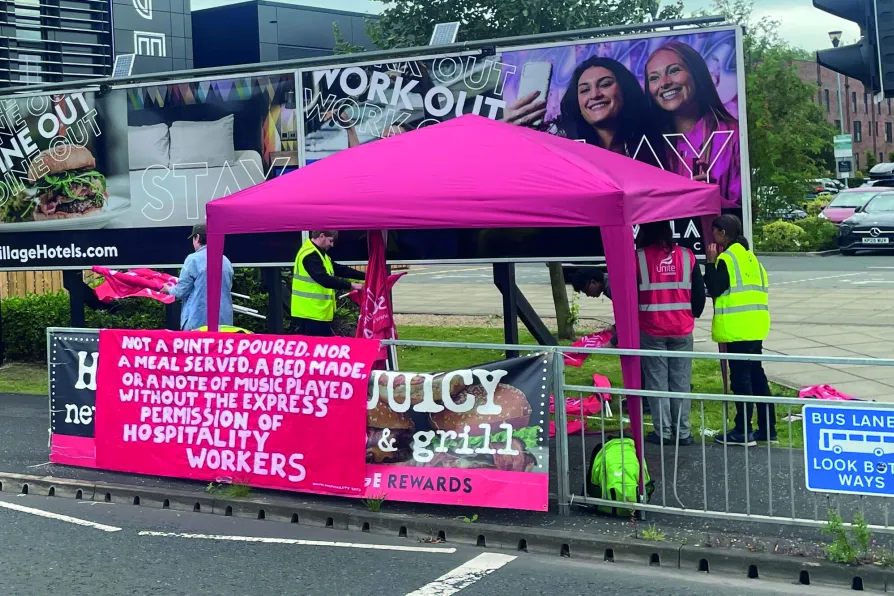SWEE ANG, the founder of Medical Aid for Palestinians, is a big believer in the power of small actions, and she is the living proof it works, writes Linda Pentz Gunter
YANA PETTICREW explains what’s behind the strike and how the entire sector rests on super-exploiting an unorganised workforce

 Striking Village Hotel workers on the picket line
Striking Village Hotel workers on the picket line
SCOTLAND’S hospitality is world renowned for its affability, its generosity, and its forthcoming frankness.
Tourists flood our urban centres and rural areas over the course of the year seeking that exact hospitality that makes up a large part of our cultural identity.
Deindustrialised areas are littered with swathes of cafes, restaurants, and hotels frequented by tourists and locals alike, and our schools are offering barista training and hospitality-specific skill building in preparation for young people entering the workforce.
The sector contributes £6 billion annually to the Scottish economy, with a further £3bn generated through the supply chain, and the total tourism spend in 2024 surmounted to £10.8bn.
Such reliance on a sector characterised by precarious hours, low pay, transience, and surging prices spells disaster for any economy that has faced a level of wage stagnation like Scotland has, and yet the sector continues to grow.
For a government dedicated to implementing “world-leading” Fair Work policies by the end of 2025, it would be expected that the Scottish government would intervene on the poor conditions faced by the hospitality worker, and yet they do not.
As customers, hospitality service may seem like a low-skilled walk in the park, but what lies underneath the facade of trendy neon signs and suffocating minimalism is exploitation en masse.
It would be a gargantuan task to outline every issue faced by a hospitality worker in the course on one shift, never mind an entire tenure at one venue. Predominantly young and migrant workers are overworked on skeleton shifts for minimum wage whilst employers expect them to work through a myriad of severe violations to employment, health & safety, and licensing law.
The sector is notorious for its vicious response towards any efforts to organise it, especially from business owners who believe it’s their God-given right to operate shabby-chic venues with extortionate prices. These prices are never reflected in increased pay for the staff, but they are reflected in the cars these employers drive or the clothes they wear.
The Covid-19 pandemic burst open the doors of Scotland’s hospitality sector with a fervour as people itched to socialise with friends and family for the first time in months, with Rishi Sunak’s Eat Out to Help Out scheme putting hospitality workers on the front line against suspicious coughs and dubious “bubbles.”
The industry underwent a serious adaptation to its model and came out the other end more precarious and transient than it had ever been. It churns through staff bases at such a high rate that some workers as young as 21 have had six or seven different employers.
Young workers are entering an industry that openly and proudly declares its exploitation of its workers as “adhering to industry standards,” where they are hardly paid enough to get a taxi home at the end of the night, never mind move out of the family home. It is, however, these young workers who are fighting for dignity and respect in the sector.
Despite its radius of just 0.63sq miles, Govan has seen its fair share of radical working-class action throughout the decades. From the rent strikes of 1915 to the UCS’s 1971 work-in, the area has been shaped by its histories of militant organisation and its production of wealth for Glasgow’s economy and today is no different.
On July 15 2025, workers at Village Hotel and Club returned a ballot with 100 per cent voting for industrial action on an 81 per cent turnout, making them the first workers at a major hotel chain to go on strike in 46 years.
Between August 2 and 31, they are on strike to secure the Real Living Wage (RLW) at £12.60 an hour; paid breaks; and backdated pay for under-21s in line with their counterparts in the Edinburgh site.
They have been picketing the site every day since August 3 and have been putting their industry-standard creativity to good use. Torturous songs such as “What’s New Pussy Cat?” and “Crazy Frog” play on continuous loops from speakers facing onto the Pub & Grill where the majority of these workers walked out from.
Village Hotels, a multimillion-pound company backed by trillion-dollar private equity firm Blackstone Inc, are pleading poverty when it comes to giving their workers over 21 a mere 39p pay rise to the Real Living Wage.
As over 60 per cent of hospitality workers aged 18-24 earn less than the RLW, they are becoming less financially mobile and therefore less likely to be spending their money in the local economy. Workers are being pushed out of the spaces they uphold, being replaced by affluent tourists who somehow don’t have enough to tip.
The Scottish economy is becoming more reliant on parasitic multinationals like Blackstone that drain our hospitable culture for the purpose of profit, not for fostering community spirit or providing accessible social spaces for all.
The regeneration of the Clydeside looks like looming hotels and cargo containers-cum-”cultural hubs” that will continue to exploit its workers until they collectively organise and fight back, just as those at Village Hotel have.
The hospitality industry must become one that respects its workers for their intensive labour and cultural underpinning, and first it must at least provide the basic means to do that.
Yana Petticrew is an organiser for Unite Hospitality Glasgow.










